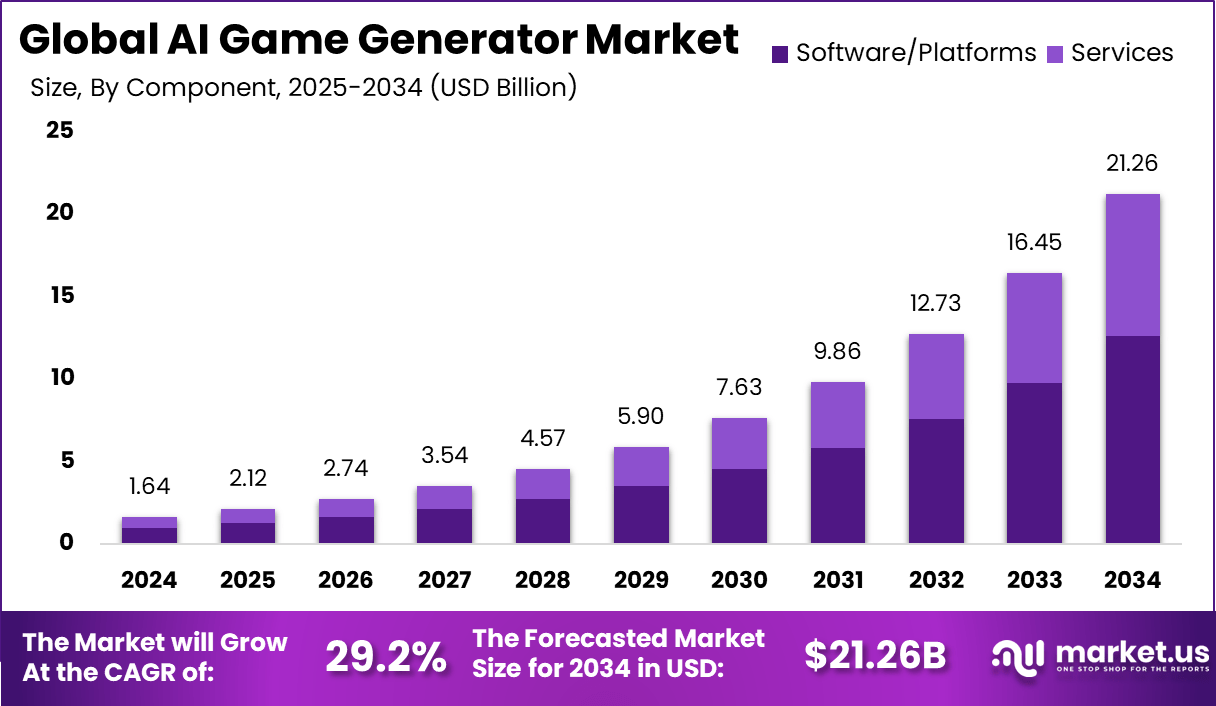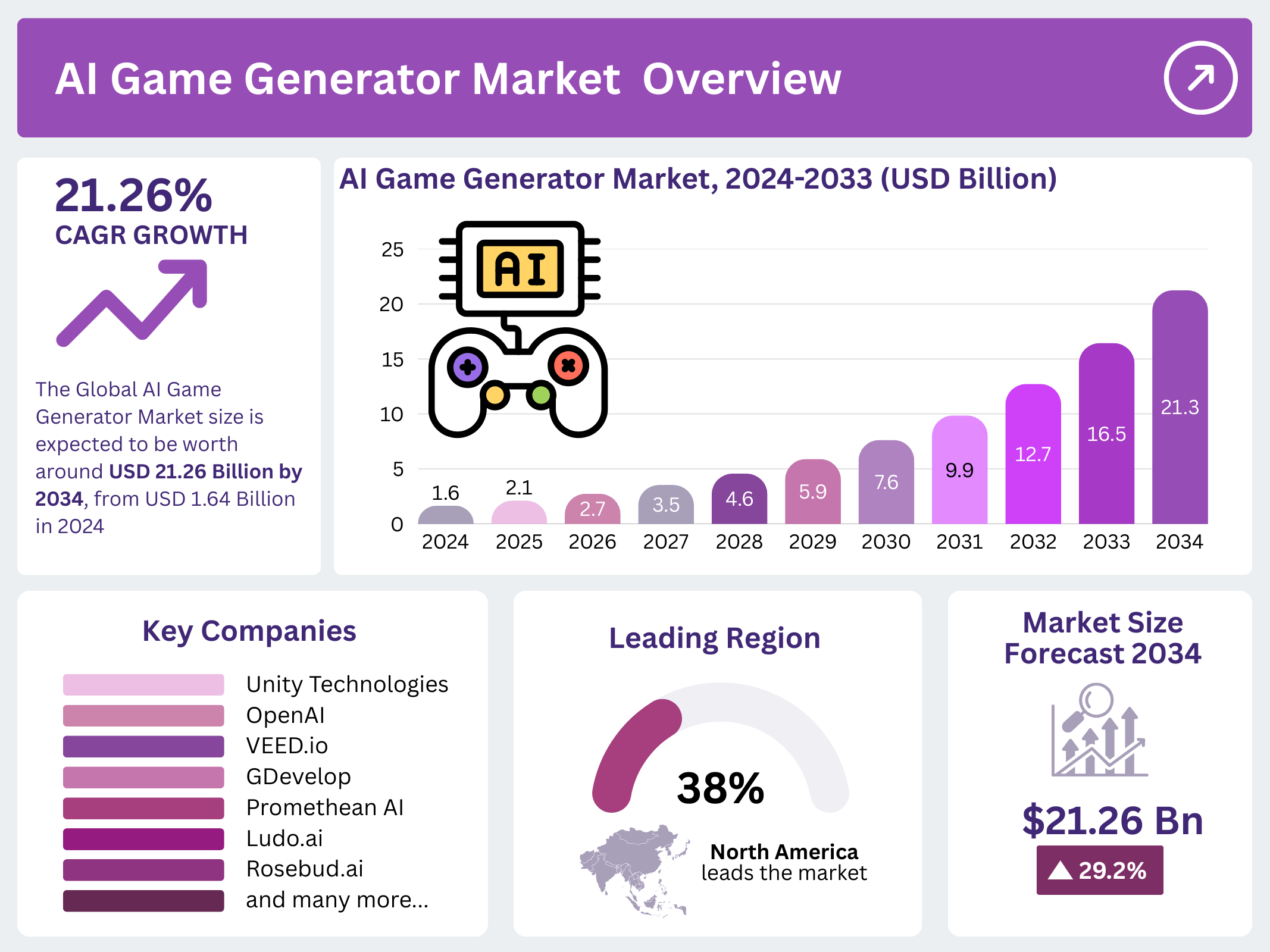Market Overview
The global AI Game Generator market is poised for rapid growth, expected to reach USD 21.26 billion by 2034, up from USD 1.64 billion in 2024, driven by a CAGR of 29.2%. The increasing use of AI to create immersive gaming experiences, automate content generation, and optimize gameplay design is propelling the market forward. Further, North America dominates the market, holding a 38% share in 2024, valued at USD 0.62 billion, as AI technology continues to revolutionize the gaming industry with new, dynamic, and personalized experiences for players.

Key Takeaways
-
The market is projected to reach USD 21.26 billion by 2034.
-
North America holds a 38% market share in 2024, valued at USD 0.62 billion.
-
The market is growing at a CAGR of 29.2%.
-
AI is transforming game development, content generation, and gameplay.
-
Strong demand for AI-driven personalized gaming experiences and automated content.
Smarter strategy starts here! Get the sample @ https://market.us/report/ai-game-generator-market/free-sample/
Role of AI
AI is revolutionizing the gaming industry by automating game design, character behavior, and content creation. AI-driven game generators enhance player experiences by creating dynamic, responsive environments that adapt to individual player actions. Machine learning models are used to generate realistic scenarios, optimize game difficulty levels, and personalize game content based on player preferences. As the gaming ecosystem grows, AI allows for the development of more immersive, engaging, and scalable experiences that resonate with a wider audience.
Analyst’s Viewpoint
AI in gaming is more than just a trend—it’s a game-changer. The rapid growth of AI-powered game generators reflects the increasing demand for more innovative, personalized, and interactive experiences. Further, developers are leveraging AI to reduce the time and cost of game creation while enhancing the gaming experience. Therefore, with the rise of AI-driven tools, the future of game development looks more automated, creative, and expansive. The market’s growth is also expected to push the boundaries of what’s possible in gaming, enabling deeper player immersion and dynamic content.
Regional Highlights
North America dominates the AI Game Generator market, accounting for 38% of the market share in 2024, valued at USD 0.62 billion. The region’s leadership is attributed to its advanced technological infrastructure, high AI adoption rates, and the presence of major gaming companies. Moreover, Europe is experiencing growth due to increasing investments in AI for gaming and mobile game development. Further, the Asia Pacific is expected to witness significant growth driven by the booming gaming industry in countries like China, Japan, and South Korea, which have robust gaming ecosystems.
Key Market Segmentation
-
By Technology: AI algorithms, machine learning models, and neural networks are used for content generation and player behavior analysis.
-
By Application: Game design, character creation, and environment generation are some of the core applications of AI game generators.
-
By End-User: Video game developers, gaming studios, and independent creators utilize AI game generators to create dynamic game content.
-
By Region: North America, Europe, Asia Pacific, Latin America, and the Middle East, with North America holding the dominant share.
Emerging Trends
-
Integration of AI in real-time procedural content generation.
-
Enhanced AI-powered non-player characters (NPCs) for more realistic behavior.
-
Adoption of AI-driven tools for personalized gaming experiences.
-
Use of AI to create dynamic in-game environments that respond to player actions.
-
Growth in AI-enhanced mobile gaming applications.
Top Use Cases
-
Procedurally generated environments that adapt based on player actions.
-
AI-powered NPCs that exhibit intelligent and varied behaviors.
-
Automated game level and storyline generation.
-
AI-driven personalization of game content to match player preferences.
-
AI used in real-time game analytics and performance optimization.
Major Challenges
-
High computational requirements for real-time AI game generation.
-
Balancing AI creativity with game development constraints.
-
Ensuring ethical and fair use of AI in game content generation.
-
Difficulty in maintaining game quality with AI-generated content.
-
Resistance to AI adoption from traditional game developers.
Attractive Opportunities
-
Development of AI-powered tools to enhance mobile game design.
-
Opportunities in virtual reality (VR) and augmented reality (AR) gaming through AI integration.
-
Expansion of AI-driven gaming platforms into emerging markets.
-
Increasing demand for AI-enhanced gaming experiences in e-sports.
-
Collaboration between AI companies and indie developers to create affordable game design solutions.
Ready to dominate your market? Get the report now @ https://market.us/purchase-report/?report_id=154204
Business Benefits
AI game generators offer businesses the ability to streamline game development, significantly reducing time and costs associated with content creation. By leveraging AI, developers can produce more dynamic and personalized gaming experiences, attracting a larger player base. Moreover, AI also allows for better in-game behavior simulations, improving overall game engagement. These benefits help game developers create more immersive and diverse content, increasing player retention and boosting revenue potential.
Recent Developments
In 2024, several major gaming companies began implementing AI game generation technologies, with advancements in procedural content generation and AI-driven NPC behavior. These innovations are expected to lead to more engaging and personalized game experiences in the coming years.
Key Players Analysis:
Leading players in the AI Game Generator market include major game development companies and AI technology providers such as Ubisoft, Electronic Arts, and Unity Technologies. These companies are integrating AI into their game design tools to improve efficiency, creativity, and personalization in game development.
- Unity Technologies
- OpenAI
- VEED.io
- GDevelop
- Scenario
- Promethean AI
- Ludo.ai
- Rosebud.ai
- Layer.ai
- Hotpot.ai
- Leonardo AI
- InWorld
- Charisma
- Meshy AI
- GANimator
- Other Key Players
Customer Insights
Players increasingly seek personalized, immersive gaming experiences that are powered by AI. They value dynamic content that adapts to their actions and preferences, and are drawn to games that offer rich, AI-generated worlds. Additionally, players are looking for faster game development cycles, and AI game generators provide this by automating many aspects of the creation process. The growing demand for innovative and customized experiences is driving game developers to adopt AI to meet customer expectations.
Future Outlook
The AI Game Generator market is poised for substantial growth, driven by technological advancements in AI and machine learning. As gaming continues to evolve into more immersive and personalized experiences, AI will play a central role in shaping the future of game development. Further, the rapid adoption of AI tools will lead to more innovative and scalable gaming solutions, propelling the industry to new heights.
Conclusion
The AI Game Generator market represents a major shift in the gaming industry, offering developers new tools for creating dynamic, personalized, and immersive experiences. With North America leading the way, the growing demand for AI-powered solutions is driving market expansion. Moreover, as AI continues to evolve, game developers will increasingly rely on AI-driven technologies to meet the expectations of an ever-growing, tech-savvy player base. The future of game development looks more automated, creative, and player-centric, opening new opportunities for growth and innovation in the gaming world.
For additional insights, visit Market.us or follow us on LinkedIn and Facebook.
Contact Us:
Mr. Lawrence John
Global Business Development Manager
Address: Lexington Avenue, Suite 300 New York City, NY 10170, United States
Phone: +1 718 874 1545 (International), +91 78878 22626 (Asia)
Email: [email protected]














